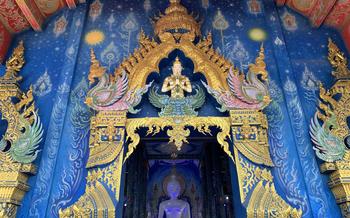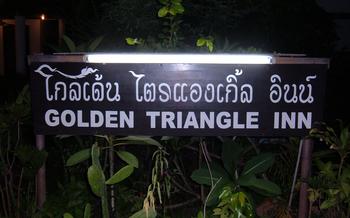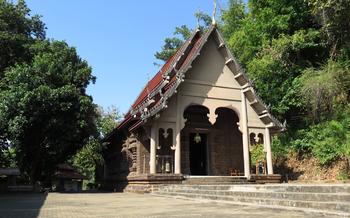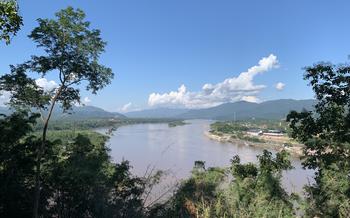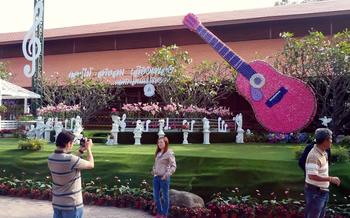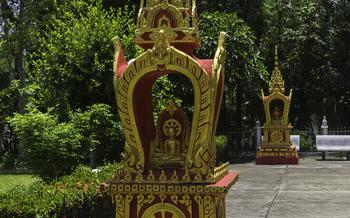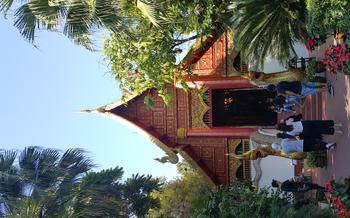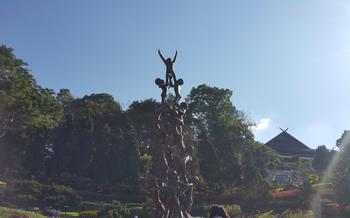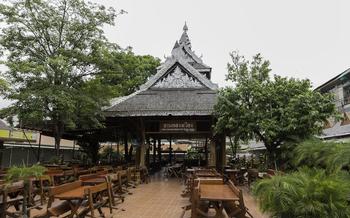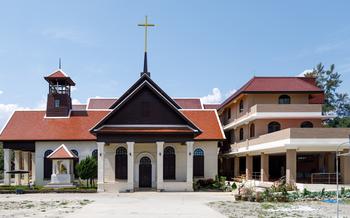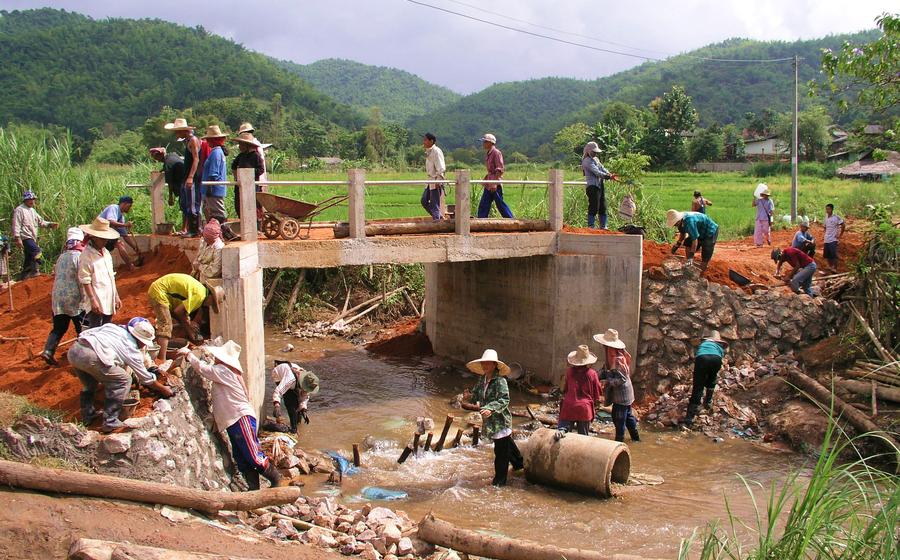
Huai Khrai Royal Development Study Center
- History of the Center: A Vision for Sustainable Agriculture
- Farming and Agriculture Initiatives: A Path to Sustainable Development
- Research and Experimentation: A Hub for Agricultural Innovation
- Demonstration Farms
- Educational Programs
- Self-Sustainability
- Agroforestry and Forest Conservation
- Royal Patronage
- Cultural Heritage: Honoring Traditions and Identity
- Hands-On Experiences
- Scenic Landscapes
- Local Cuisine
- Volunteer Opportunities
- Insider Tip
History of the Center: A Vision for Sustainable Agriculture
The Huai Khrai Royal Development Study Center stands as a testament to the visionary leadership of His Majesty the late King Bhumibol Adulyadej. Established in 1974, the center was born from the King's profound concern for the well-being of Thai farmers and his desire to promote sustainable agricultural practices. Recognizing the challenges faced by farmers in the region, including poverty, soil degradation, and water scarcity, the King envisioned a center that would serve as a hub for agricultural research, experimentation, and demonstration.
The center's mission is threefold: to conduct research and experimentation on sustainable farming practices, to demonstrate these practices to farmers and the general public, and to provide training and extension services to farmers in the surrounding areas. Through these initiatives, the center aims to improve the livelihoods of farmers, promote food security, and protect the natural resources of the region.
Farming and Agriculture Initiatives: A Path to Sustainable Development
The Huai Khrai Royal Development Study Center spearheads sustainable farming practices, emphasizing crop diversification, soil management, and water conservation. Recognizing the importance of agricultural resilience, the center promotes a holistic approach to farming, ensuring soil fertility, water efficiency, and crop diversity. Sustainable farming techniques, such as crop rotation, composting, and water-saving irrigation systems, are demonstrated and implemented to minimize environmental impact and maximize agricultural productivity.
Success stories abound at the center. The introduction of new crop varieties, such as drought-resistant rice and high-yield vegetables, has significantly improved crop yields and increased farmers' incomes. Agroforestry practices, integrating trees with agricultural crops, have enhanced soil fertility, reduced erosion, and provided additional sources of income through the sale of non-timber forest products. The center's efforts in water management, including rainwater harvesting and efficient irrigation systems, have ensured a reliable water supply for agriculture, even during dry seasons.
Research and Experimentation: A Hub for Agricultural Innovation
The Huai Khrai Royal Development Study Center serves as a vital hub for agricultural research and experimentation, dedicated to advancing sustainable farming practices in Thailand. Through rigorous testing and development, the center plays a crucial role in improving crop varieties, introducing innovative farming techniques, and promoting sustainable agriculture.
Researchers at the center conduct extensive experiments on various crops, including rice, vegetables, fruits, and herbs. They evaluate different varieties, study their adaptability to local conditions, and assess their resistance to pests and diseases. By identifying high-yielding and resilient crops, the center contributes to enhancing agricultural productivity and ensuring food security in the region.
In addition to crop research, the center also focuses on developing sustainable farming methods that minimize environmental impact. Experiments are conducted on soil management practices, water conservation techniques, and the use of organic fertilizers and pest control methods. By promoting sustainable agriculture, the center aims to reduce chemical inputs, protect natural resources, and improve the overall health of the ecosystem.
Furthermore, the center collaborates closely with local farmers, agricultural institutions, and research organizations to share knowledge, exchange experiences, and promote the adoption of innovative farming practices. Through workshops, seminars, and field demonstrations, the center provides a platform for farmers to learn about new technologies, improve their skills, and enhance their agricultural productivity.
Demonstration Farms
The Huai Khrai Royal Development Study Center showcases its sustainable farming practices through a series of demonstration farms. These farms are designed to provide practical examples of how farmers can implement sustainable methods in their own operations. Visitors can stroll through the farms and observe various crops, including rice, vegetables, fruits, and herbs, grown using techniques that prioritize soil health, water conservation, and biodiversity. The center also raises livestock, such as chickens, ducks, and pigs, using sustainable practices that promote animal welfare and reduce environmental impact. These demonstration farms serve as a valuable resource for farmers and agricultural enthusiasts, offering tangible examples of how sustainable agriculture can be successfully implemented.
Educational Programs
The Huai Khrai Royal Development Study Center provides a range of educational programs to promote agricultural knowledge and sustainable farming practices. These programs are designed to cater to different audiences, including students, farmers, and the general public.
Field trips are a popular option for schools and educational institutions. Students can visit the center to learn about sustainable agriculture, witness firsthand the implementation of various farming techniques, and interact with agricultural experts. Workshops and courses are also offered, covering topics such as organic farming, crop diversification, and water management. These programs provide participants with in-depth knowledge and practical skills in sustainable agriculture.
The center also organizes training programs and workshops for local farmers, equipping them with the necessary skills and knowledge to improve their farming practices and increase their productivity. Extension services and technical assistance are provided to surrounding communities, enabling farmers to adopt sustainable farming methods and enhance their agricultural practices.
By offering a range of educational programs, the Huai Khrai Royal Development Study Center plays a vital role in promoting sustainable agriculture and fostering a new generation of farmers who are committed to environmentally friendly and sustainable farming practices.
Self-Sustainability
The Huai Khrai Royal Development Study Center operates on the principle of self-sustainability, striving to be independent and self-reliant in its operations. This is achieved through various initiatives:
-
Income Generation: The center generates income through the sale of agricultural products, such as crops, livestock, and processed goods. This income is used to support the center's operations, research, and educational programs.
-
Renewable Energy: The center utilizes renewable energy sources to meet its energy needs. Solar panels generate electricity, while biogas produced from animal waste is used for cooking and heating.
-
Waste Management: The center practices effective waste management, including composting and recycling, to minimize its environmental impact and promote sustainability.
-
Water Conservation: Water conservation measures are implemented, such as rainwater harvesting and efficient irrigation systems, to ensure the judicious use of water resources.
-
Local Sourcing: The center emphasizes the use of local resources and inputs, supporting the local economy and reducing its reliance on external sources.
These initiatives contribute to the center's self-sufficiency, allowing it to operate sustainably and serve as a model for other agricultural development projects.
Agroforestry and Forest Conservation
The Huai Khrai Royal Development Study Center embraces agroforestry practices to promote environmental sustainability. Agroforestry is an integrated approach that combines forestry and agriculture, aiming to optimize land use while preserving the natural ecosystem. By planting trees alongside crops, the center creates a diverse and resilient farming system. Trees provide shade, regulate temperature, and improve soil fertility, benefiting both crops and livestock.
The center actively protects and conserves natural forests within its boundaries. These forests serve as habitats for diverse plant and animal species, contributing to biodiversity conservation. The center's efforts in agroforestry and forest conservation align with its commitment to sustainable agriculture and responsible land management. By promoting agroforestry practices, the center demonstrates how agriculture and ecology can coexist harmoniously, mitigating climate change and preserving the delicate balance of the natural world.
Royal Patronage
The Huai Khrai Royal Development Study Center has received unwavering support and guidance from the Thai Royal Family since its inception. Their Majesties King Bhumibol Adulyadej and Queen Sirikit have visited the center on numerous occasions, providing advice, encouragement, and hands-on support to the staff and farmers. Their visits have helped to raise awareness of the center's work and to promote the importance of sustainable agriculture in Thailand.
The late King Bhumibol Adulyadej was a renowned advocate for sustainable development and self-sufficiency. His vision for the center was to create a model of sustainable agriculture that could be replicated throughout the country, helping to improve the livelihoods of farmers and to protect the environment. His Majesty's legacy continues to inspire the center's staff and to guide its work in promoting sustainable farming practices and community development.
The current King, His Majesty King Maha Vajiralongkorn Bodindradebayavarangkun, has continued to support the center and its work. He has visited the center on several occasions, underscoring the importance of sustainable agriculture in Thailand's development. The Royal Family's ongoing patronage of the Huai Khrai Royal Development Study Center is a testament to their commitment to improving the lives of Thai farmers and to promoting sustainable agriculture as a cornerstone of Thailand's development.
Cultural Heritage: Honoring Traditions and Identity
The Huai Khrai Royal Development Study Center is not just a hub for agricultural innovation; it also serves as a custodian of Thailand's rich cultural heritage. Visitors can immerse themselves in the traditions and practices that have shaped the country's agricultural identity for generations. Workshops and demonstrations showcase traditional farming techniques, from plowing with water buffaloes to weaving intricate bamboo baskets. These hands-on experiences allow visitors to connect with the land and appreciate the skills that have sustained communities for centuries.
The center also places great importance on preserving traditional Thai crafts, such as pottery, weaving, and woodcarving. Local artisans showcase their skills and products, providing visitors with a glimpse into the artistry and craftsmanship that are deeply rooted in Thai culture. By supporting these traditional practices, the center helps to ensure that they continue to thrive in the modern world.
Hands-On Experiences
At the Huai Khrai Royal Development Study Center, visitors are not mere spectators; they are active participants in the agricultural journey. The center offers a range of hands-on experiences that allow visitors to immerse themselves in the world of sustainable farming. From planting seeds and harvesting crops to caring for animals and learning traditional farming techniques, there is something for everyone to discover.
These hands-on experiences are not just educational; they are also deeply rewarding. Visitors get to connect with nature, learn about the challenges and joys of farming, and contribute to the center's mission of sustainable agriculture. Whether you are a seasoned farmer or simply curious about where your food comes from, the Huai Khrai Royal Development Study Center offers an unforgettable and enriching experience.
Insider Tip:
- For a truly immersive experience, consider volunteering at the center for a few days or weeks. This will give you the opportunity to work alongside local farmers, learn more about sustainable agriculture, and contribute to the center's ongoing projects.
Scenic Landscapes
The Huai Khrai Royal Development Study Center is not just a place for agricultural learning and innovation; it is also a haven of natural beauty. Nestled amidst rolling hills and lush greenery, the center offers breathtaking panoramic views that will captivate nature lovers. Stroll through the verdant fields, admire the vibrant colors of the crops, and let the gentle breeze caress your face. The tranquil and serene atmosphere of the center provides a perfect escape from the hustle and bustle of city life. Whether you seek relaxation, contemplation, or a deeper connection with nature, the scenic landscapes of the Huai Khrai Royal Development Study Center will provide an unforgettable experience.
Local Cuisine
The Huai Khrai Royal Development Study Center not only promotes sustainable agriculture but also showcases the culinary delights of the region. Visitors can enjoy delicious meals prepared using fresh ingredients harvested from the center's farms. The emphasis is on traditional Thai dishes and local specialties, all prepared with sustainable practices.
The kitchen team is passionate about using seasonal produce and creating dishes that highlight the flavors of the region. From fragrant curries and spicy salads to hearty soups and grilled meats, there's something for every palate. Visitors can dine in the center's charming restaurant, which offers both indoor and outdoor seating, surrounded by beautiful gardens and lush greenery.
For a truly unique dining experience, visitors can opt for the farm-to-table dinner, where they can witness the journey of their food from the farm to the table. They can learn about the ingredients, their cultivation, and the sustainable practices employed by the center. The chefs will prepare a special menu using the freshest produce of the day, ensuring a memorable and educational dining experience.
Whether it's a quick lunch break during a tour of the center or a leisurely dinner in the serene surroundings, visitors are sure to enjoy the local cuisine at the Huai Khrai Royal Development Study Center. It's a culinary celebration of sustainable agriculture, where delicious food meets responsible farming practices.
Volunteer Opportunities
The Huai Khrai Royal Development Study Center welcomes volunteers who are passionate about sustainable agriculture and community development. Volunteering at the center provides a unique opportunity to contribute to its initiatives while gaining hands-on experience in farming practices. Volunteers can participate in various activities, such as planting, harvesting, animal care, and agricultural research. They also have the chance to engage with local farmers and learn about their challenges and successes. By volunteering at the center, visitors can make a meaningful impact while immersing themselves in the local culture and lifestyle.
To volunteer, interested individuals should contact the center directly to inquire about available opportunities and requirements. The center offers flexible volunteer programs, allowing visitors to choose the duration of their stay and the activities they wish to participate in. Whether visitors have a few days or several weeks, volunteering at the Huai Khrai Royal Development Study Center is a rewarding and enriching experience that combines sustainable agriculture with cultural immersion.
Insider Tip
To fully immerse yourself in the vibrant agricultural tapestry of Huai Khrai, plan your visit during the annual Royal Agricultural Fair, typically held in December or January. This lively event showcases the center's achievements, with exhibitions of innovative farming techniques, local produce, and traditional crafts. Witness farmers proudly displaying their finest crops, livestock, and homemade products while enjoying live music, cultural performances, and a lively market atmosphere.
Combine your visit to Huai Khrai with a broader exploration of Chiang Rai's natural and cultural wonders. Discover the stunning Golden Triangle, where the borders of Thailand, Laos, and Myanmar converge, offering breathtaking views and rich cultural experiences. Visit the White Temple, known for its intricate architecture and gleaming white façade, a testament to local artistry and devotion. For an adventure into the wild, explore the Doi Pha Tang National Park, home to diverse flora and fauna, including the elusive clouded leopard.
To make the most of your visit to Huai Khrai, embrace the opportunity to interact respectfully with the local community. Engage with farmers, learn about their sustainable practices, and ask questions about their way of life. Participate in hands-on activities, whether it's planting seedlings, harvesting rice, or feeding the animals. Your genuine interest and curiosity will be warmly welcomed, fostering a deeper connection with the people behind the center's success.
